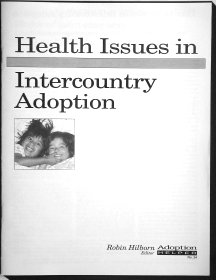
Health Issues in
Intercountry
Adoption
By Robin Hilborn
Second edition, 2008
$12 / ISBN 978-0-9809468-0-2
| Family Helper > Adoption > Health Issues |

|
Health Issues in Intercountry Adoption By Robin Hilborn
Second edition, 2008 |
|
KNOW THE RISKS Risks of adopting institutionally Orphanage life harms children The healthiest children come from ... [country survey] What the studies say How to interpret medical reports
YOUR CHILD'S HEALTH |
PRE-ADOPTION ASSESSMENT Before adopting: assessment is vital to your decision Agency checks children's health Doctors you can call on for an assessment
POST-ADOPTION ASSESSMENT
YOUR HEALTH
RESOURCES
STATISTICS |
To order a copy, fill in this form and send with your cheque to: 421 Clarendon St., Box 1203, Southampton, Ont. N0H 2L0 Canada.
|
Please send me one copy of Health Issues in Intercountry Adoption (#51) |
I enclose a $12 cheque to "Robin Hilborn". Name: Street address: City: |
Discount. Health Issues (#51) is also available at a discount ($9) when you order four or more titles from the Family Helper series. See the form at Family Helper, and choose the editions you'd like to order.
In preparing this second edition of Health Issues in Intercountry Adoption I've dropped coverage of the risks of adopting from Romania, which has banned foreign adoptions. But I've added: risks of disease in various countries, what the studies say about the health of international adoptees, how to protect your family from diseases from abroad, an all-new resource list, and the international adoption statistics for 2006.
Is absolutely every child adopted from another country bound to have medical and developmental problems?
Not necessarily -- even Dr. Elinor Ames, who studied the worst case imaginable -- children from dictatorship-era orphanages in Romania; severe lack of basic stimulation -- found that over one-third of Romanian children, once home in British Columbia, had no serious problems at all.
Still, love is not enough -- children who have suffered prolonged neglect and abuse in orphanages may require expert care for a long time ("Orphanage life harms children").
And speaking of orphanage children, Dr. Dana Johnson reviewed nearly 1,000 such cases. His verdict: "The chance of an institutionalized child being completely normal is essentially zero".
I've tried to face the question "Which country has the healthiest children?" head on, but you'll see the trouble I had. There just doesn't seem to be a country-by-country summary of which diseases are prevalent in adoptable children. I ended up listing, for each disease, what various studies say about infection rates abroad.
In two new pages I've reviewed six studies on the health of international adoptees. There aren't a great many such studies, and especially little seems to have been published on children adopted after 2001. Consequently it's hard to get a grasp on conditions today. Are tuberculosis rates still as high as they were in the 1990s studies? Are orphanage caregivers now monitored more closely for TB?
People are not eager to talk about their problems, which may explain why medical issues are not prominent in articles contributed to Adoption Helper, the forerunner to Family Helper. However we do have the accounts of five families and their medical problems.
"Malnutrition is the most common problem" say the Westacotts and they offer good tips on choosing foods so your child will flourish after a deprived start in life.
It comes with the territory ... when you adopt internationally (or domestically) there may be health risks. The kids are at risk because of why they're available for adoption: abandonment, poverty, illness or death of parents, alcoholism, drug abuse, child abuse or neglect. Children may have had poor prenatal or postnatal care, early neglect and lack of health care such as immunizations. According to Dr. Jane Aronson, the top five medical problems of Chinese children are malnutrition, rickets, anemia, lead poisoning and asthma.
The question is uppermost in your mind: will my child be in good health? Given that you may be proposed a child with malnutrition, parasites, minor congenital defects, developmental delay, tuberculosis, hepatitis or HIV/AIDS (and the list goes on), how do you make a choice based on the slim information you get? The prudent parent turns for advice from an expert in assessing the health of children in foreign countries.
And finally, you need to be concerned about your own health, and that of family and friends -- what diseases could you catch from your child? I have suggestions on protecting those close to you.
Reputable agencies will give you as much information as possible on a child's background and medical history, but no-one will guarantee that your child from abroad will be perfectly normal. Once home you may find that her medical and developmental problems present parenting challenges. You will need to be flexible, and unafraid to call on expert help.
P.S. For information on international adoption in general, see my "Canadian Guide to Intercountry Adoption", www.familyhelper.net/ad/adguide.html.
EXCERPT
From the Introduction to Health Issues in Intercountry Adoption
By Robin Hilborn, Editor, Family Helper
How to order Health Issues in Intercountry Adoption
Robin Hilborn edits and publishes Family Helper, which began as Adoption Helper in 1990. Write to him at helper@familyhelper.net.
| Infertility | Adoption | Adoption Resource Central | Post-adoption | Family Tree |
| Contact: Robin Hilborn, helper@familyhelper.net 421 Clarendon St., Box 1203, Southampton, Ont. N0H 2L0 Canada |
Copyright 2009 Robin Hilborn. All rights reserved Updated Dec. 12, 2009 |
|
Family Helper www.familyhelper.net |
A WEB RESOURCE FOR FAMILIES SINCE 1996 | |||
| About us Copyright Privacy Disclaimer |